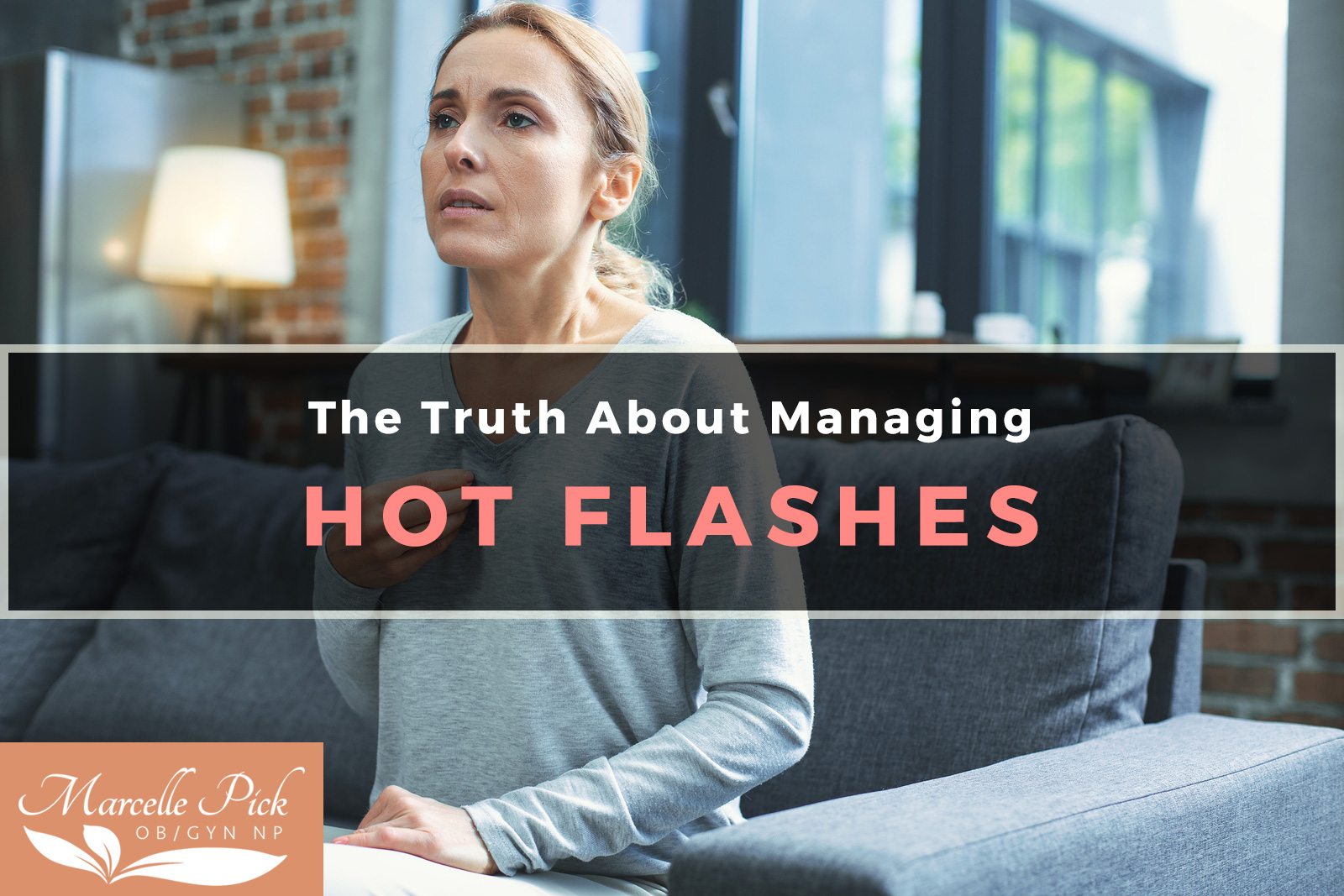My friend Pam prides herself on being patient with her children, and doesn’t believe in yelling as a parenting technique.
But last week, she found herself standing in her living room, shrieking at her son to just stop arguing and take out the trash. Her rant went on for five minutes, starting with trash and progressing through a long list of gripes, while her 10-year-old stared at her in shock, then burst into tears.
When Pam regained control, she instantly felt pangs of guilt and remorse. How could she talk to him that way? She couldn’t imagine what had come over her. Then she told me this wasn’t the first time she’s felt that way.
Recently, she said, the words irritable, grouchy, snappy and testy were the ones she’d use most often to describe herself. She was having verbal outbursts, like the one with her son, with all of the important people in her life. She was desperate to feel differently, to feel like her “old self” again, but just couldn’t seem to get a handle on it.
She’s certainly not alone. Mood swings and irritability are two very common, but distressing, symptoms of perimenopause or any hormonal imbalance. And if you’ve had a history of issues with premenstrual syndrome (PMS), these symptoms might manifest more often with each passing year.
How many times have you heard jokes on tv or in the movies about menopause spurring irrational anger and irritability? It seems to be the heart of so many one-liners, and often draws a lot of laughs. But when you hear words you never thought you’d say coming out of your mouth, directed at people you love, it doesn’t feel so funny does it?
If you can relate to this story a little too well, I want to assure you that you don’t have to live this way. You can control those moods and keep that internal volcano in check with a few simple steps. An imbalance in your hormones is often the root of the crankiness issue, and when you focus on bringing these hormones back to their optimal levels, you can find that irritability quickly fading away. Let’s learn how to control your hormonal mood swings.
How Hormones Upset Internal Peace
Although hormones naturally rise and fall throughout your lifetime, it isn’t normal for them to be so out of whack that you are consistently feeling miserable.
Some natural changes happen around your menstrual cycle, for example. Estrogen rises on the first day of your period, and drops mid-cycle. Progesterone rises mid-cycle right before ovulation, then drops a day or two before your period begins.
But some women have progesterone levels that are far too low all the time, which can result in nasty symptoms, like feelings of constant irritation. Often, this deficiency is a result of ongoing stress. When your body is under a constant barrage of stress, it calls for an ongoing supply of cortisol. And if your adrenals are busy pumping out cortisol, there can be a direct impact on the production of sex hormones, resulting in imbalances.
The good news is, there are some simple solutions. A progesterone cream, for instance, can be very effective in treatment of PMS symptoms. And don’t forget the power of food. Paying close attention to the quality of your nutrition. It can have a bigger impact than any prescription!
Hormones can be linked to so many aspects of your health, including how you view the world. Studies have shown that during the latter part of a woman’s menstrual cycle, called the luteal phase, brain changes may have you hearing words in a more negative way, or cause a stronger reaction to touchy subjects or events.
Research also indicates that the second half of the monthly cycle, for some women, feels “darker.” This could mean she is less able to adapt to stress, could have lagging energy, and react in a much more “prickly” way than usual.
PMS, it is often thought, exposes how a woman feels inside. While she can control her internal upset most of the time, physiological changes just before her period (or in perimenopause) release the tension, and she explodes. Think of it like a soda bottle that’s been shaken. Balanced hormones are like the lid on the bottle, keeping everything contained. But when those hormones shift out of balance, the lid comes off and negativity comes spraying out at anyone unfortunate enough to be standing nearby.
Sometimes, you can keep the lid on simply by paying more attention to what you are eating: if you are eating too many refined carbohydrates and sugar, for instance, your insulin levels may spike, and your progesterone levels may suffer.
It’s important to be gentle with yourself if you’ve experienced these explosions. Taking the time to accept and understand what is happening can open you up to examining your life, and what might be shaking it up in a way that doesn’t feel right. Give yourself permission to take care of yourself, and you just might be able to care for others more lovingly.
Hormonal Mood Swings in Perimenopause: Your Self-Discovery
Are you surprised to hear that physical changes can be behind your increased testiness and hormonal mood swings? That means that no one is immune.
The most calm and patient woman can enter perimenopause and find herself snapping at everyone around her, feel irrational rage when someone cuts her off in traffic, and find herself muttering about how stupid people are without even caring who hears her. Often, women like Pam don’t even recognize themselves in who they have become – and they don’t particularly like this new, shrill woman.
If spewing angry words becomes your new normal, regret can soon begin to take over. A typical cycle develops: outbursts followed by guilt and remorse that sink you down so much they ultimately cause another outburst. My goal with my patients is to break this self destructive cycle by correcting their imbalanced hormones so they can see that menopause is a time to thrive.
I’ve found that the journey from perimenopause through menopause to postmenopause is a time of great opportunity for many women. This transition is the perfect chance to rediscover who you are – and who you want to be. Your physical, emotional and spiritual attributes are all intertwined on this journey, so you may find old issues resurfacing as you grapple with these big questions. Your touchiness might just be a hint that something needs to be understood and dealt with once and for all.
What Can I Do After I’ve Lost it on Someone?
When you snap at someone you love, you might feel guilt, which mixed with the already uncomfortable crankiness can send you into a spiral of negativity. You may start saying terrible things to yourself as well I’m a horrible mother, how could I say that kind of thing to my child, what is wrong with me? If you get stuck in this kind of internal monologue the incident will linger far too long, leaving you feeling shame, embarrassment and out of control. It can go on and on, staying with you well after the person you snapped at has moved on. It’s important to remember that this one moment in time doesn’t define you. While you can’t change what happened, you always have a chance to repair the damage. But how? There are some simple steps you can take to move past the moment.
- Allow yourself to feel upset. Your emotion is real, justified or not. Stifling your anger or frustration just keeps it inside, waiting for another moment to push its way out.
- Take some cool down time. Don’t try to talk about the situation immediately if you still feel angry. Walk away, take deep breaths, and let the feeling pass.
- Forgive others, and most importantly, forgive yourself. Everybody has moments they wish they could change. Understanding this might help you have compassion, both for yourself and those you have hurt. Be sure to apologize if warranted; sometimes offering a short explanation about what made you explode can help you both get past the hurt. But once you’ve apologized, it’s time to move on.
If you find yourself dwelling on outbursts, hanging on to guilt, embarrassment or shame, the incidents might have greater impact on your life than is warranted. If you find yourself exploding often then wallowing in guilt, you might need some quiet time for reflection, or you might want to try working with a therapist or other program to adequately process those feelings.
Balance Your Hormones to Balance Your Mood
It’s important to remember that crankiness experienced in perimenopause probably won’t last forever. And you can help speed the process and move through the irritation by giving your body what it needs to achieve hormonal balance. Try these steps:
Eat right and eat regularly
Have you heard the term “hangry”? Don’t let that be you. Eating at regular intervals keeps your blood sugar stable, which in turn keeps your moods level. And I can’t stress enough how important it is to eat the right kinds of food. If you’re eating a lot of sugary treats, your body will have a really hard time keeping those blood sugar levels where they need to be for you to feel your best. And balanced nutrition is essential for providing your body with the nutrients it requires to produce sufficient energy, keep hormones balanced, and keep your mood on an even keel.
Make sleep a priority
I know it can be tough to get yourself to bed at a reasonable hour, but it’s so important to reducing stress, which in turn reduces the amount of the stress hormone cortisol your body produces. I recommend getting between 7 and 9 hours of sleep per night. And if you find your energy flagging and your mood slumping, try a quick nap to keep your crankiness at bay.
Get up and move
You can maintain hormonal and emotional balance by making sure you are getting consistent physical activity. That doesn’t mean you have to spend hours at a gym – meditative practices like yoga count! Whatever you choose, make sure it’s something you love so you don’t have to fight to find the motivation to participate.
Tranquility is Possible When You Practice Loving Kindness Towards Yourself and Others
It’s unusual to find a woman in perimenopause who hasn’t had a touchy moment every now and again. It doesn’t feel good to find yourself there, but it’s not an unforgivable offense. Use these outbursts as “teachable moments” for yourself; take some time to find out what’s behind them, and you might be able to get to what you need without exploding. Recognize how bad it makes you feel to unload on innocent friends and family, but remember that the moment will pass, and you are still worthy of love and respect.
Pam realized that she was feeling overwhelmed and underappreciated. She sat down with her family and came up with a schedule of chores for everyone, which helped her find the time she needed to exercise, eat properly and get to bed earlier. What can you do to treat yourself well, which will allow you to treat everyone around you better too? Make your hormonal health a priority as you move towards the best you yet!
Sometimes, You Need a Little Support for Hormonal Mood Swings
Making changes to long established habits can be tough. If you find yourself stuck, you might need a little extra supplemental support to get yourself over the hump. I have some programs designed to support your body through this amazing journey in just the right ways. Let me help you find the solution that works for you!
- Multi Essentials. Sometimes, you just need a little nutrient support. Making sure a high-quality multivitamin complex is part of your daily routine can keep you feeling great.
- My Menopause Support is designed to alleviate all the discomforts of menopause, including those uncontrollable mood swings. Decades of helping patients through the aggravating symptoms of menopause helped me develop this blend that contains exactly the right balance of herbs, vitamins and nutrients to help you feel like yourself again.
- My Menopause Program may be just what you need to get back on the right track. My program doesn’t contain soy, making it a non-phytoestrogen formula. The program includes Multi Essentials, Menopause Support and my Adrenal Support Formula – a complete package to restore hormonal balance and bring back the old you.
It can be a long journey when you are working to bring your hormones back into balance. You don’t have to travel it alone!








